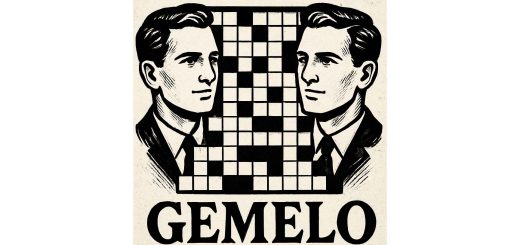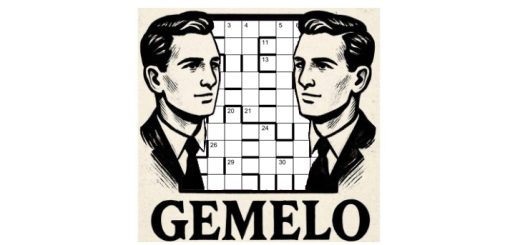Notes for Gemelo 11
There are usually one or two points of interest in an Observer barred puzzle, and here we pick them out for comment. Please feel free to add your own questions or observations on any aspect of the puzzle (including clues not listed below) either by using the comment form at the bottom of the page or, if would prefer that your question/comment is not publicly visible, by email.
Gemelo 11 Plain
Please give your own G-rating for this Gemelo puzzle by clicking on the relevant star above, with one star representing a very straightforward solve by your own standards (Gentle) and five stars indicating a seriously tough one (Ghastly). If you accidentally select the wrong star, you can change your vote by simply clicking on a different one. Note that hovering over the ‘graph’ icon will show you the full breakdown of votes for the current puzzle.
After the ‘constrained’ G9, which received an average rating of 2.5, you felt (quite justifiably in my view!) that G10 was considerably trickier, giving it a rating of 3.9, the most popular score being a ‘4’, which matched my assessment.
Congratulation to the two ‘regulars’ who were prize-winners for Gemelo 8. Also, if you haven’t already read it, this article by Caitlin O’Kane, the Observer Puzzles Editor, is worth a look.
Today’s puzzle, I have to say, didn’t do a lot for me. Many of the surface readings disappointed, seeming not to have received sufficient ‘polishing’, and one or two clues seemed a little bit too clever. But I’ll be interested to hear what you made of it.
Setters’ Corner: This week I’m going to look at clue 22d, “Ignition provided that spins round (6)”. A two-letter conjunction meaning ‘provided that’ is reversed (‘spins’) and followed by a noun answering to ‘ring’. However, the clue features a construction which I suspect would not trouble most crossword editors but which I would always avoid – a charade of an element containing a main verb in the present indicative and one or more additional elements. ‘Provided that spins’ is fine for a reversal of the ‘provided that’ word, but it’s a statement rather than a noun expression, so adding something on the end shouldn’t be allowed: ‘A contains B C’, for instance, can only mean ‘A around (B+C), not ‘(A around B) + C’. The answer for the conscientious setter is to ensure that all elements are noun expressions, eg ‘provided that spinning round’ / ‘A containing B C’ or ‘provided that that spins round’ / ‘A that contains B C’. Incidentally, one could argue that in the clue for 22d it is just the ‘provided’ which leads to the two-letter word (it has that sense in conversational English), with ‘that’ being a relative pronoun, such that the result is indeed a noun expression – this may or may not have been the setter’s intention.
Across
1a Measure sand grouse or guinea fowl, each without trouble (4)
One can’t deny that this is clever, containing as it does two wordplays that have been amalgamated. Another name for a sand grouse, when deprived of (‘without’) a verb meaning ‘[to] trouble’ provides the solution, as does another name for the guinea fowl without a noun meaning ‘trouble’.
9a Australian uses this to launch Beethoven’s unnumbered works, bungling German (9)
Easy to biff the wrong answer if you’ve got a few crossers but not the first one and you’re not overly familiar with the cataloguing of Beethoven’s works (I’m sure Schroeder wouldn’t have had any problems here). A three-letter abbreviation of the German phrase meaning ‘works without opus number’ is followed by an anagram (‘bungling’) of GERMAN.
10a Irish policeman retreating, covered in eggs, with violence on the way? (8, 2 words)
A five-letter Irish policeman is reversed (‘retreating’) inside (‘covered in’) a word for eggs of the fishy kind. The definition of the (4,4) answer is mildly oblique.
14a There’s more to come in obligation to make digital advancement? (6)
A three-letter abbreviation used at the end of a written page to indicate that “there’s more to come” is contained by a word for an obligation, the result being a verb with a slightly more oblique definition than that in 10a.
20a Branch liable to wither, having lost core following power of the sun (6)
Hands up everyone who knew the five-letter word for ‘liable to wither’ which must lose its middle letter (‘core’) and be preceded by the normal spelling of the name of the Egyptian sun-god (‘power of the sun’). You will note that my hand remains fixed at my side.
21a Firmly establish missing lead is back (3)
One of those clues where the solver is almost certain to find themselves working back from the solution (an adverb meaning ‘[towards the] back’ in the context of a ship or aircraft) to the four-letter word meaning ‘[to] firmly establish’ which must shed its first letter (‘missing lead’), this turning out to be an H.
28a Tongue River cutting border (4)
The six-letter name of a river associated with Liverpool (and Gerry and the Pacemakers) is stripped of its first and last letters (‘cutting border’) to produce the name of a particular language (‘tongue’). Given that there are a lot of rivers in the world, and a lot of languages too, this clue strikes me as being rather unsatisfactory.
29a Unplanned movement to steal a coin of James VI, with corresponding punishment (8)
A three-letter ‘unplanned movement’, often indicated in clues by ‘twitch’, contains (‘to steal’) A (from the clue) and the name of ‘a Scottish coin of James VI, with a lion on the obverse, worth 74 shillings Scots’. I’m not sure that the definition is entirely accurate, but we know what the setter is getting at.
Down
1d Bonnet, say, or crown worn by Irish (6)
A four-letter word for the crown of the head containing (‘worn by’) the usual abbreviation for ‘Irish’ produces a term which could be applied to Stere Bonnet, a true one-off. Born in 1688 near Bridgetown, Barbados, he and his two sisters inherited a plantation following the early deaths of their parents. He was educated and raised to be a gentleman, marrying the daughter of a planter, and having three sons and a daughter. He became a major in the island’s militia and was made a Justice of the Peace in January 1716. Not long afterwards, Major Bonnet informed his friends and family that he was leaving Barbados. In March 1718, he prepared the legal papers that allowed his wife and two friends to conduct his affairs while he was away. Then he did what anyone in his position would have done – despite knowing next to nothing about seamanship, he bought a sloop, named it Revenge, armed it with ten guns, hired a 70-man crew, and became a buccaneer called Captain Edwards. It all started off quite well, but then he had the misfortune to run into Blackbeard (Edward Teach), who tricked him first into giving up command of the Revenge and then into seeking a royal pardon which meant that Blackbeard could make off with all their accumulated loot. Undaunted, he reinvented himself as Captain Thomas and went back to his freebooting ways, but unfortunately for him he was captured, and despite making one escape he was executed in December 1718, his filibustering career having lasted less that nine months.
4d Keep measuring livestock, no longer used at all (9, 2 words)
A four-letter ‘keep’ of the stronghold type, a two-letter preposition meaning, among many other things, ‘measuring’, and an obsolete (‘no longer used’) word for ‘cattle’ or ‘livestock’ combine to produce the (3,6) answer always seen in a negative construction, eg “He can’t score a goal at all”.
6d Monkeys from this country biting a Cockney’s backside (7)
The two-letter abbreviation for ‘this country’ if you live within GB and NI, containing (‘biting’) the letter A (from clue), is followed by the Cockney word for the backside. This is one of those rather convoluted bits of rhyming slang, the word being a contraction of the name of a Greek philosopher; this rhymes with ‘bottle’, which is short for ‘bottle and glass’. You can probably work out the concluding rhyme.
7d Short musical sequence with love in abundance (5, 2 words)
A five-letter ‘sequence in melody’ missing its last letter (‘short’) is followed by the usual representation of ‘love’, the result being a (1,2-2) expression which also includes an accent, quite impressive for such a small package.
13d About period involving comeback of conservative political viewpoint? (9)
An &lit (all-in-one) clue, where the whole thing stands an indication of the answer. The wordplay has that familiar two-letter bit of commercial jargon meaning ‘concerning’ or ‘about’ being followed by a three-letter word for a period (ice or stone being examples) containing (‘involving’) a reversal (‘comeback’) of a four-letter acronym which was on occasion mockingly applied to Margaret Thatcher. Addressing the Conservative Women’s Conference on 21 May 1980, she said, “We have to get our production and our earnings into balance. There’s no easy popularity in what we are proposing but it is fundamentally sound. Yet I believe people accept there’s no real alternative.” The phrase ‘there is no alternative’ became a political slogan much used in support of economic liberalism, and has been revived by other politicians in more recent times.
15d Trumpet call from Oban welcoming head of local navy into port (7)
A two-letter Scots word for ‘[to] call’ containing (‘welcoming’) the first letter of ‘local’ precedes the single-letter abbreviation for ‘navy’ inside (‘into’) the name of a South American port (the only one that crossword setters seem to care about – I wonder how that makes Valparaiso feel).
18d Water too long delayed through what turned up (7)
A word meaning ‘late’ or (as explicitly shown by Chambers) ‘too long delayed’ is contained by the two-letter interjection almost invariably indicated in cryptics by ‘what’, the whole lot being reversed (‘turned up’)
27d What one needs to bowl over, dismissing player with bats from Perth (4)
This is one of those nice ideas that didn’t quite work out. A (3,6) phrase for an impressive quality (‘what one needs to bowl over’) loses (‘dismissing’) a five-letter word for a player (of the sort that treads the boards), the result being a Scots (‘in Perth’) word meaning ‘crazy’. The cricket-related surface reading isn’t convincing, but, worse than that, ‘bowl over’ is a transitive verb, so in the cryptic reading it needs to be something like ‘bowl people over’. On top of that, I’m not at all keen on ‘with’ being used to link the wordplay and definition in a clue.
(definitions are underlined)


